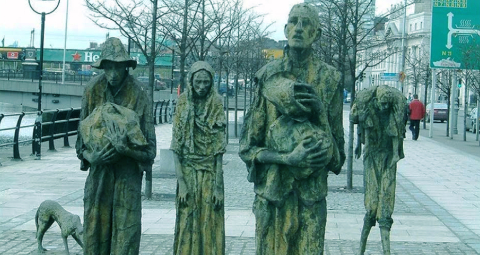December 6 | ![]() 0 COMMENTS
0 COMMENTS ![]() print
print

The people vs the truth about anti-Catholic bigotry
Hugh Dougherty explains why Irish Catholics are owed an apology over the Ulster Plantation and its bitter legacy in the West of Scotland.
It has become fashionable to apologise for the sins of the fathers. We’ve seen cities, universities and entire countries apologising for the evils of slavery, and, like Glasgow, expressing regret for the fact that much of the wealth that fuelled the industrial revolution originated from back-breaking slavery on the plantations.
But, there’s another plantation which never seems to be in the frame for the issuing of an apology. And it’s this: the Plantation of Ulster.
That’s the process by with King James I and V1 parcelled out large parts of the nine counties of the historic province of Ulster, giving them to largely Scottish lords and earls who had become an embarrassment to him as they clamoured around his new court in London demanding that the loans they’d made to him were repaid.
Banished
This was genius in the eyes of James. Not only would these troublesome Scots nobles be gone, but they would also be hard at work conquering the native, Catholic, Irish of Ulster, driving them from their fertile land and banishing them to poverty in areas which made agriculture a challenge.
At a stroke King James, the Wisest Fool in Christendom, as he was known, had solved his problem, but it was at that point that the monarch created issues that have resonated, and which continue to resonate down to this day, in both the historic province of Ulster and also in Scotland.
For what James managed to do, probably intentionally, was to create a class of Protestants who regarded themselves as superior to the native Irish Catholics, so producing the root causes of the sectarianism that we know to this day.
Stolen land
It worked like this. The dispossessed native Irish Catholics, just like my Dougherty ancestors, whose lands in the fertile Laggan area between Derry and Letterkenny were confiscated by Scottish nobles, such as the Cunninghams of Ayrshire, were forced into the mountains of Innishowen to eke out a precarious existence. Add to that the flooding of the fertile parts of Ulster with lowland, Scottish Protestants by the nobles, to provide a workforce, and their Calvinistic viewpoint, which taught that they were predestined for Heaven and so superior to the untrustworthy, lazy, Rome-loving Catholics, and you can see why they began to view themselves as The People.
Don’t forget the Penal Laws, which made it almost impossible for Catholics to practice their Faith, and which imposed restrictions on property-owning. You soon come to realise that the Plantation of Ulster was planned and carried out with the express intention of persecuting the native, Ulster Catholics.
Forward two centuries, and the thousands of Catholics, working the worst of the land and subsisting on potatoes, were almost wiped out by the Great Hunger of the 1840s—An Gorta Mor, or, more accurately, The Starvation, as it was actively regarded by the British government as an ideal means of controlling the Irish population.
Persecution
The result was that thousands who were able made their way to Derry to board the steamship service for Glasgow and the West of Scotland, to seek work where—poor, starving, and the very opposite of the prosperous, God-fearing and hard-working, Ulster and Scottish Protestant—they were despised and persecuted from the first minute of their arrival.
So, you have to stand back from the various erroneous attempts to explain sectarianism today, for its root cause is the Plantation of Ulster, which produced the conditions which led to the mass Irish migration to Glasgow and the West of Scotland, and, to a lesser extent to Edinburgh and Dundee, too.
That’s why Orange flute bands still trail the Protestant coat in both Ulster, and yes, there are Orange lodges in Donegal, Cavan and Monaghan, as well as the six occupied counties of Ulster, and here in Scotland.
Sectarianism
What they are doing is echoing the first principle of the Plantation, that they are The People, and that we, as Catholics, are inferior. It’s an approach that ran through the lack of employment opportunities for Catholics in Scotland for more than a century, and the gerrymandered, anti-Catholic statelet of Northern Ireland.
Above all, it’s the root cause of sectarianism, attacks on Catholics, attacks on Catholic churches, and, most recently, attacks on Catholic schools, seen by some, behind their curtain of secular respectability, though they would never say it aloud, as institutions which have allowed Catholics to get above themselves through the quality education they provide.
That’s why we need an apology for the Plantation of Ulster, and, just as Glasgow benefited from the slave trade, so the city, and much of the West of Scotland benefitted from the Plantation of Ulster. If you apologise for slavery, then you need to apologise for the abuse heaped on my ancestors and our co-religionists, historically, before even trying to make sense of anti-Catholicism in Scotland today.
I wouldn’t hold my breath. It’s far easier to have a go at Catholic schools, or blame Republican marches for attracting the ire of Loyalist mobs, to this day still fuelled by Plantation philosophy, than to face up to facts and lay the ghost of the evils of the Plantation of Ulster, once and for all.
But saying ‘sorry’ would be a step in the right direction.










